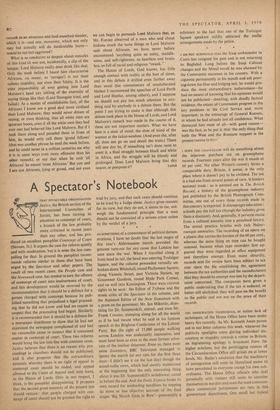A Spectator's Notebook
THAT INVALUABLE ORGANISATION
Justice, the British section of the International Committee of Jurists, has been turning its attention to contempt of court, a branch of the law probably more criticised in recent years than any other, and has pro- duced an excellent pamphlet Contempt of Court (Stevens, 5s.). It argues the case for reform quietly and with moderation, but it is none the less com- pelling for that. In general the pamphlet recom- mends reforms similar to those that have been urged by the Spectator and other papers. The result of two recent cases, the People case and the Newsweek case, has tended to turn the offence of contempt of court into inadvertence of court, and this development would be reversed by the recommendation that it should be a defence for a person charged with contempt because he pub- lished something that prejudiced a legal proceed- ing that he did not know and had no reason to suspect that the proceeding had begun. Similarly it is recommended that it should be a defence for a newspaper distributor to show that he had not examined the newspaper complained of and had no reasonable cause to suspect that it contained matter in contempt of court. These two reforms would bring the law into line with common sense. Justice believes that there is no reason why pro- ceedings in chambers should not be publicised; and it also proposes that the extraordinary anomaly whereby there is no right of appeal in contempt cases should be ended, and appeal allowed to the Court of Appeal and, with leave, to the House of Lords. Only in one respect, I think, is the pamphlet disappointing. It proposes that the second great anomaly of the present law should remain : that people charged with con- tempt of court should not be granted the right to trial by jury, and that such cases should continue to be tried by a Judge alone. Justice gives reasons for its view, but they do not, it seems to me, out- weigh the fundamental principle that a man should not be convicted of a serious crime unless by the verdict of a jury.


































 Previous page
Previous page